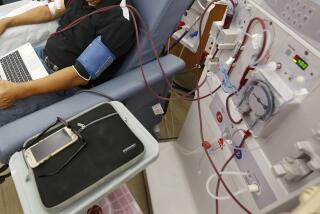A Happy Camper 5 Months Later
- Share via
Charles Ridgeway was back riding an all-terrain vehicle on a trip to Pismo Beach last week, and he felt great.
It was one of the first times he had been out riding since Easter weekend, when he, his wife, Betty, and daughter Robin, 26, visited an isolated desert campground in southeast California.
That was before Ridgeway, 47, an accounting manager for Rockwell International in Anaheim, made headlines in March as the object of a frantic search, then a dramatic flight to a hospital.
Ridgeway suffers from a genetic disorder and needed a kidney transplant. When a rare donor kidney matching Ridgeway’s B positive blood type became available, he was 200 miles away at a sand dunes campsite, near the Imperial County town of Glamis, close to the Colorado River.
Through the efforts of the couple’s son, Matt, 24, a search and rescue team and KNX-radio helicopter pilot-reporter Bob Tur, Ridgeway was found at the campground and flown to Orange County early Easter morning. He was taken to Western Medical Center-Santa Ana for the transplant, with just six hours left before the donor kidney would have become unusable.
Ridgeway was in the hospital just nine days and returned to work--full time--on June 5. With the new kidney, he has resumed a normal life.
“Things are just going great,” Ridgeway said Thursday. “I can’t be more fortunate. There’s the freedom, enjoying the food, the energy level.”
Ridgeway has suffered from a genetic disorder that causes cysts to grow on his kidneys, eventually strangling the organs.
He first learned about the disease in 1976. The only sign at the time was high blood pressure.
Everything had been controlled until about two years ago, when his condition began to deteriorate. He complained of extreme fatigue and loss of appetite.
In January, he started to undergo kidney dialysis three times a week to remove impurities from the blood. At the time, just 5% of his kidney was functional. Ridgeway was placed on a diet of low protein and potassium and high calories.
“It’s not a choice, it’s just what you do to stay alive,” he said.
About a month later, he put his name on the list of candidates for a kidney transplant. Ridgeway did not expect a donor organ to become available quickly, because he was told to expect a wait of six months to three years.
Then, the day before Easter, the hospital found him to be a perfect match for the kidney, which came from a dead teen-age girl whose identity was not made public.
“It matched me, and it didn’t match anyone else,” he said.
Ridgeway’s son found the campground after searching by car. Tur spotted Matt Ridgeway and picked him up, then the son directed the helicopter pilot to his father’s encampment. The helicopter got the patient to an Orange County Sheriff’s Department Search and Rescue plane, which then flew Ridgeway to John Wayne Airport.
Ridgeway was a bit apprehensive about the surgery, which lasted 90 minutes, but was confident that his choice to go through with the transplant would bring him a better life.
“Because I had so long to consider things, I was ready,” he said.
Soon after the operation, he noticed that he had more energy, but there was a lot of worry that his body might reject the organ.
“The most stressful thing was trying to get your medication regulated,” he said. “You’re warned. It’s easy to become paranoid and a bit of a hypochondriac.”
About three weeks after leaving the hospital, his body showed signs of rejecting the kidney. Ridgeway returned to the hospital for three days, where he was treated with antibiotics. He has not had a problem since then.
Ann Breckenridge, transplant coordinator for the hospital, said his body could reject the kidney at any time, even 10 years from now.
“Anyone who is a transplant patient could expect more problems,” she said. “They’re taught to be tuned in to any problem.”
For Ridgeway, one of the best things since the operation is not having to undergo dialysis.
“It was just a big physical and mental strain,” Ridgeway said. “Now, I just have to carry a bag of pills. It’s a lot better than the alternative. The real kidney brings you up to almost a normal level.”
He takes medication six times a day. He carries a small alarm to remind him when to take another dose.
Still, he occasionally gets tired when returning to his Anaheim home from work. But, he said, “anybody else who’s almost 50 years old gets tired after work.”
Ridgeway’s energy level and quick recovery are common among transplant patients, Breckenridge said. “Any transplant patient will have a tremendous willingness to go out and do things, to spend time with their family, to work, to live.”
His recovery has been “very, very excellent,” she said.
Ridgeway has been told to avoid such heavy physical activity as contact sports. And he can only putt around easily on his four-wheel off-road motorcycle--no more jumps and jolts in the desert. But that’s a small price to pay for what he has now, Ridgeway said.
And now he can enjoy eating almost anything. “Everything looks and tastes so good,” Ridgeway said. “I never enjoyed food so much.”
More to Read
Sign up for Essential California
The most important California stories and recommendations in your inbox every morning.
You may occasionally receive promotional content from the Los Angeles Times.













